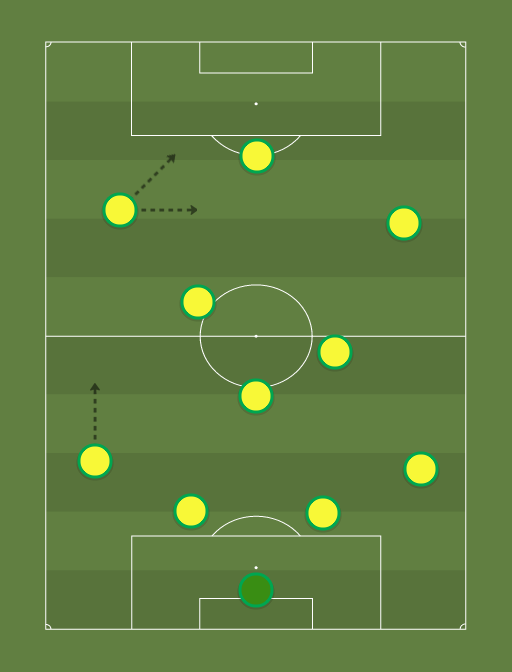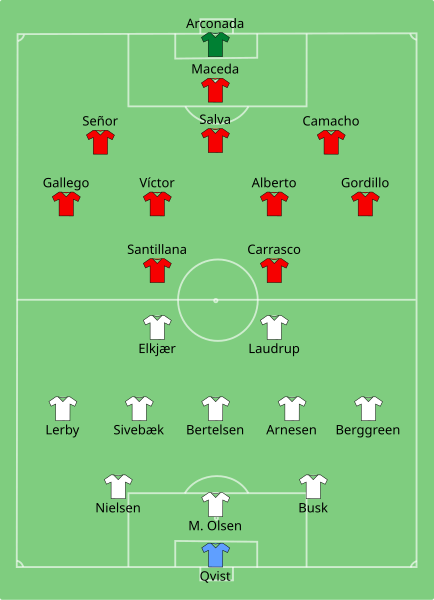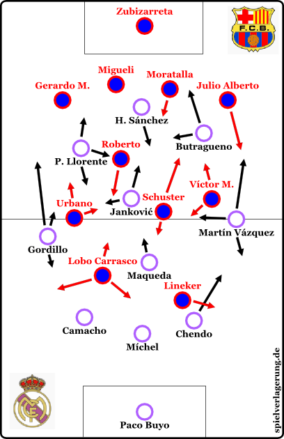Physiocrat
Has No Mates
- Joined
- Jun 29, 2010
- Messages
- 9,568
Beam/Synco

Michaelf7

Beam/Synco
Tactics / four phases of the game:
Offensive transition: Play out of the back fast & direct with our expert passers. Use the speed of Blokhin and Chislenko, Kanté's midfield runs, and van Basten's hold up play.
Attacking phase: If we can't finish on the counter, cultured possession game to create breakthroughs. Laudrup and Redondo pulling the strings, wide players targeting Michael's fullbacks 1:1. The entire front four carries a massive goal threat.
Defensive transition: Drop back to prevent Kempes and Ronaldo from getting behind our backline. Immediate counterpressing from the nearest attackers to hamper Michael's directness in transition. Goal is not to regain the ball at all costs, but to slow down the counter, letting the rest of the team take up defensive positions.
Defensive phase: Two tight banks of four restricting space in front of our box; aim is to prevent Kempes and Ronaldo from attacking at speed, curbing Michael's biggest threat. Kanté to harrass Zidane at every opportunity. After winning the ball, restart the cycle as above.
Michaelf7
My team will play a 4-3-3 formation with Gordillo as a wingback on the left side behind inside forward Kempes while on the right side Dzodzuashvili will play as a more defensive full back behind winger Johnstone. Up front Ronaldo will have the freedom to roam and drift with Kempes moving centrally when necessary. I will now detail some of the lesser-known players in my team before outlining the major advantage that I think my team has in this fixture.
Revaz Dzodzuashvili had 49 caps for the USSR between 1969 and 1974 and was including in the team of the tournament for the 1972 Euro's. Dzodzuashvili was the best RB of the season in the USSR in 1969, 1971, 1972 and 1973; 2nd best RB of the season in the USSR in 1970; and 3rd best RB of the season in the USSR in 1974. Dzodzuashvili was best known for shutting down all-time great wingers doing this against George Best in both of their matches and against Dragan Dzajic for all but 20 minutes of the four matches they played against each other. Blokhin (his probable opponent in this match) only scored 1 goal in 6 matches against Dzodzuashvili in 1972, 1973 and 1974 (the years when both won caps for the USSR national team and were both including in the best 3 players of the season in their position in the USSR).
Rafael Gordillo has 75 Spanish caps and finished 15th in France Football's Football Player of the Century, which was voted on by 30 players who won the Ballon d'Or between 1956 and 1999 (excluding Best, Matthews, Sivori and Yashin). He was according to the Spanish magazine Don Balon the best Spanish player in the 1979-80 season. Gordillo was equally comfortable both as a wingback and a midfielder. Spanish journalist Alfredo Relaño described Gordillo's style of play as follows:
Source
On winning the Ballon d'Or in 1987, Ruud Gullit said:
Source
This could be just Gullit being humble but even if so, it is interesting that Gullit chose Gordillo over the likes of Platini, Boniek, Matthaus, and Baresi among others or more obviously saying that it should be open to non-Europeans and Maradona should win it.
In the following clip, former Liverpool and Scotland defender Steve Nicol answers Gordillo to a question on the greatest opponent he has faced.
Carlos Valderrama won 111 caps for Colombia and was the South American footballer of the year in 1993. Despite not being the quickest he was good at finding room to receive and distribute the ball as well as being a superb passer both short to control the tempo and long through balls to create chances. Montpellier teammate and French international Stéphane Paille described his playing style as follows:
Source
Another Montpellier teammate Laurent Blanc praised his ball retention abilities as follows:
Source
Ronaldo vs. Nemanja Vidic
I now move on to the matchup that I think is the major advantage that my team has in this contest which is Ronaldo vs. Nemanja Vidic. In 2014 ESPN.com writer stated that pace has always been Vidic's major weakness (Source) which Liverpool era Fernando Torres took full advantage of. As Vidic was an elite defender, I would normally not mention this but 94/95-98/99 Ronaldo is one of the worst ever attackers for a defender with a pace weakness to play against in my opinion particularly when Ronaldo is being supplied by two brilliant passers in Valderrama and Zidane.
During this period (94/95-98/99) Ronaldo won the Ballon d'Or in 1997 (also finishing 1 vote behind the winner in 1996), FIFA World Player of the Year in 1996 and 1997, top goalscorer once each in both the Netherlands and Spain, 1998 Serie A Footballer of the Year, UEFA Club Footballer of the Year in 1997-98, Golden Ball winner at the 1998 World Cup, MVP at the 1997 Copa America and was included in the All Star team of both the 1997 and 1999 Copa America's.
Bobby Robson said that Ronaldo was the best player he worked with and describes him as follows:
Source
Zinedine Zidane stated that “When Ronaldo had the ball, he ran at 2,000 miles per hour,” (Source). Marcel Desailly said that “I’ve never seen a player able to show such precise control at such high speed,” (Source). Below is a video of Ronaldo's incredible pace during this period prior to his injuries:
Here is a highlights video of Ronaldo's 96/97 season at Barcelona:

Michaelf7

Beam/Synco
Tactics / four phases of the game:
Offensive transition: Play out of the back fast & direct with our expert passers. Use the speed of Blokhin and Chislenko, Kanté's midfield runs, and van Basten's hold up play.
Attacking phase: If we can't finish on the counter, cultured possession game to create breakthroughs. Laudrup and Redondo pulling the strings, wide players targeting Michael's fullbacks 1:1. The entire front four carries a massive goal threat.
Defensive transition: Drop back to prevent Kempes and Ronaldo from getting behind our backline. Immediate counterpressing from the nearest attackers to hamper Michael's directness in transition. Goal is not to regain the ball at all costs, but to slow down the counter, letting the rest of the team take up defensive positions.
Defensive phase: Two tight banks of four restricting space in front of our box; aim is to prevent Kempes and Ronaldo from attacking at speed, curbing Michael's biggest threat. Kanté to harrass Zidane at every opportunity. After winning the ball, restart the cycle as above.
Michaelf7
My team will play a 4-3-3 formation with Gordillo as a wingback on the left side behind inside forward Kempes while on the right side Dzodzuashvili will play as a more defensive full back behind winger Johnstone. Up front Ronaldo will have the freedom to roam and drift with Kempes moving centrally when necessary. I will now detail some of the lesser-known players in my team before outlining the major advantage that I think my team has in this fixture.
Revaz Dzodzuashvili had 49 caps for the USSR between 1969 and 1974 and was including in the team of the tournament for the 1972 Euro's. Dzodzuashvili was the best RB of the season in the USSR in 1969, 1971, 1972 and 1973; 2nd best RB of the season in the USSR in 1970; and 3rd best RB of the season in the USSR in 1974. Dzodzuashvili was best known for shutting down all-time great wingers doing this against George Best in both of their matches and against Dragan Dzajic for all but 20 minutes of the four matches they played against each other. Blokhin (his probable opponent in this match) only scored 1 goal in 6 matches against Dzodzuashvili in 1972, 1973 and 1974 (the years when both won caps for the USSR national team and were both including in the best 3 players of the season in their position in the USSR).
Rafael Gordillo has 75 Spanish caps and finished 15th in France Football's Football Player of the Century, which was voted on by 30 players who won the Ballon d'Or between 1956 and 1999 (excluding Best, Matthews, Sivori and Yashin). He was according to the Spanish magazine Don Balon the best Spanish player in the 1979-80 season. Gordillo was equally comfortable both as a wingback and a midfielder. Spanish journalist Alfredo Relaño described Gordillo's style of play as follows:
always from the left wing, with a tireless rise and fall and a very good technique in his left leg, with which he scored many goals and gave many more. Míchel in one band and Gordillo in the other were the key to those great years of Madrid de la Quinta. There was practically no game he played, with Madrid, with Betis or with the national team, in which he was not the full dominator of his area, a wide strip of ten meters wide from one corner pennant to the other, on the left wing of his team.
Source
On winning the Ballon d'Or in 1987, Ruud Gullit said:
I appreciate this award, but it's not fair. I would have given it to Gordillo. He's the best player to step on the pitch now.
Source
This could be just Gullit being humble but even if so, it is interesting that Gullit chose Gordillo over the likes of Platini, Boniek, Matthaus, and Baresi among others or more obviously saying that it should be open to non-Europeans and Maradona should win it.
In the following clip, former Liverpool and Scotland defender Steve Nicol answers Gordillo to a question on the greatest opponent he has faced.
Carlos Valderrama won 111 caps for Colombia and was the South American footballer of the year in 1993. Despite not being the quickest he was good at finding room to receive and distribute the ball as well as being a superb passer both short to control the tempo and long through balls to create chances. Montpellier teammate and French international Stéphane Paille described his playing style as follows:
I really liked how he played. One touch, South American ‘toque’ style, very efficient. Carlos always made the right pass at the right time. It was a pleasure to play in the same team as him.
Source
Another Montpellier teammate Laurent Blanc praised his ball retention abilities as follows:
He was a natural exponent of ‘toque’, keeping the ball moving. But he was so gifted that we could give him the ball when we didn’t know what else to do with it knowing he wouldn’t lose it… and often he would do things that most of us only dream about!
Source
Ronaldo vs. Nemanja Vidic
I now move on to the matchup that I think is the major advantage that my team has in this contest which is Ronaldo vs. Nemanja Vidic. In 2014 ESPN.com writer stated that pace has always been Vidic's major weakness (Source) which Liverpool era Fernando Torres took full advantage of. As Vidic was an elite defender, I would normally not mention this but 94/95-98/99 Ronaldo is one of the worst ever attackers for a defender with a pace weakness to play against in my opinion particularly when Ronaldo is being supplied by two brilliant passers in Valderrama and Zidane.
During this period (94/95-98/99) Ronaldo won the Ballon d'Or in 1997 (also finishing 1 vote behind the winner in 1996), FIFA World Player of the Year in 1996 and 1997, top goalscorer once each in both the Netherlands and Spain, 1998 Serie A Footballer of the Year, UEFA Club Footballer of the Year in 1997-98, Golden Ball winner at the 1998 World Cup, MVP at the 1997 Copa America and was included in the All Star team of both the 1997 and 1999 Copa America's.
Bobby Robson said that Ronaldo was the best player he worked with and describes him as follows:
Ronaldo was lean, mean, as quick as an Olympic sprinter and some of the goals he scored had me shaking my head in disbelief.
Source
Zinedine Zidane stated that “When Ronaldo had the ball, he ran at 2,000 miles per hour,” (Source). Marcel Desailly said that “I’ve never seen a player able to show such precise control at such high speed,” (Source). Below is a video of Ronaldo's incredible pace during this period prior to his injuries:
Here is a highlights video of Ronaldo's 96/97 season at Barcelona:
Last edited:









